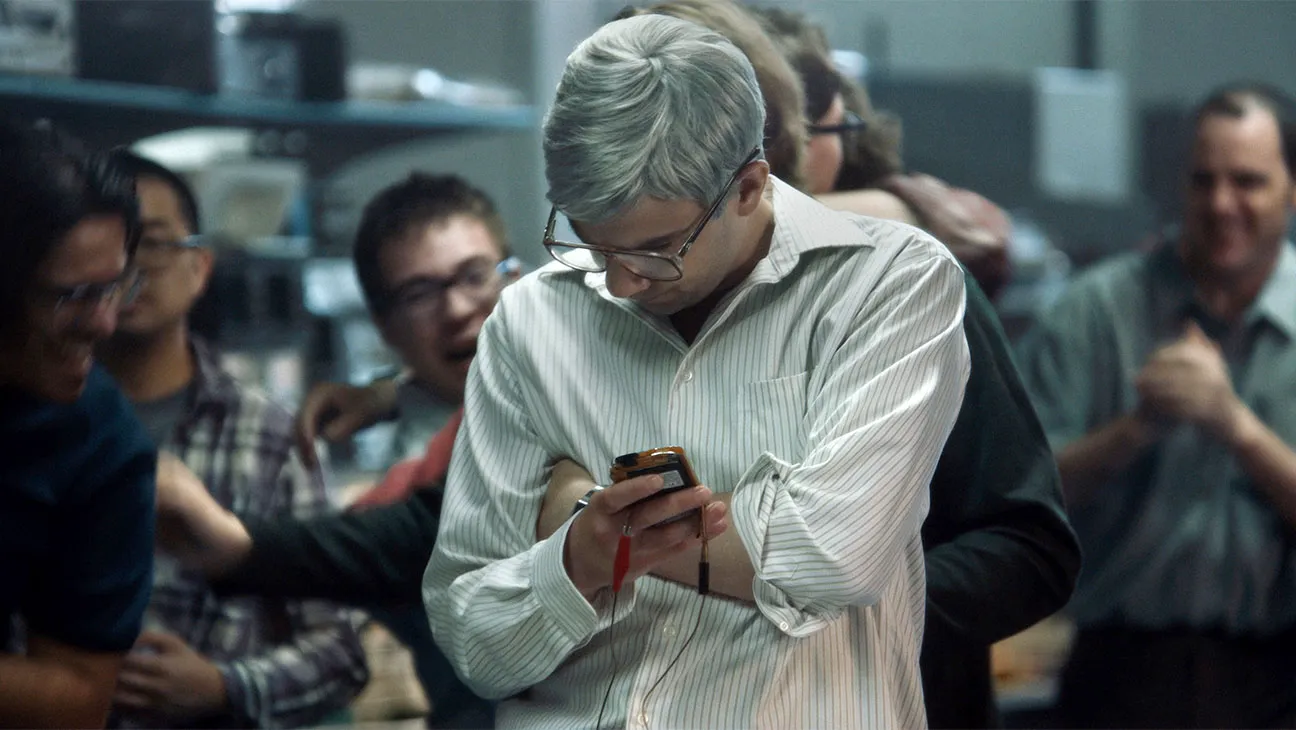The Rise and Fall of BlackBerry: A Tech Saga
Mike Lazaridis (Jay Baruchel), a tech whiz, leads a small company that produces various chips. However, the company isn’t particularly successful financially. Mike and his buddy Doug (Matt Johnson) are trying to sell a new invention to major corporations: an advanced handheld phone that also works as a pager and computer. But they’re not having any luck because, while they’re good at inventing and building, they lack marketing skills. Jim Balsillie (Glenn Howerton from “It’s Always Sunny in Philadelphia,” the film’s most brilliant casting choice), a tough and unscrupulous character, steps in to help. He doesn’t know anything about technology, but he’s excellent at getting under the skin of customers. He was even fired from his previous job for being too proactive.

A scene from the movie “BlackBerry”
The story of BlackBerry is so well-suited to the biographical film format that it’s surprising it took filmmakers so long to get to it. Consider this: it’s both a success and a failure story rolled into one, and it seems to have all the most prominent archetypes of such narratives. There are anxious geniuses, corporate sharks, naive dreamers, and ruthless managers who destroy all the fun and turn a once-thriving team of friends into a soulless money-printing machine. But the best part is that BlackBerry demonstrates that these archetypes are not static. Depending on the stage of their lives, the same people can be very different characters. Mike Lazaridis at the start of the film is a typical uplifting biopic hero: talented and willing to push the boundaries of what is possible. Lazaridis in the finale is the villain of the same genre: a cold businessman horrified that he is about to be swept away by the tide of progress (in the form of Apple, of course).
A Transformation in Form and Content
Matt Johnson’s film meticulously depicts this transformation, not just in terms of content but also in terms of form. The first half of the film feels somewhat chaotic. The camera rushes through offices, searching for faces and random details; it’s subjective and alive, like in McKay’s “The Big Short” or the series “The Office.” Although this is more of Johnson’s style than a borrowing from other authors: he used to make semi-experimental mockumentaries and has only now gotten to make films with big actors. Even in an obviously scripted film, he manages to create a sense of chaos. The BlackBerry office (or Research in Motion at the time) becomes a primordial soup of talent and ideas, from which it is unknown what will emerge. Even the engineers themselves don’t know because they assemble prototypes on the fly and literally from whatever they can find.

A scene from the movie “BlackBerry”
The mockumentary style persists throughout the film, but the chaotic spirit fades over time. Offices transform from computer clubs into dull gray boxes, the excited shouts and friendly squabbles disappear, and even movie nights vanish. Instead of chaotic comedic scenes, a more specific plot with financial machinations emerges. Matt Johnson, in showing the company’s downfall, also experiments with himself, seeing if he can abandon his free style and confine himself to tighter genre boundaries. Unlike BlackBerry, which rapidly lost its identity with the arrival of big money, Johnson succeeds: even within the rather stifling confines of a corporate biopic, he retains his wit and scriptwriting elegance. His film is also a masterclass in refrains. Phrases spoken by the characters in one context are later repeated in a completely different one, suddenly meaning something entirely opposite, further emphasizing how much everything has changed. And initially amusing details gradually acquire sad connotations. For example, at the very beginning, it is shown how Lazaridis sensitively hears the buzzing of low-quality electronics and cannot stand it - he personally undertakes to fix the device right in someone else’s office. In the end, he brings his own company to the point where buzzing is now everywhere.
The Price of Progress
For a film about technological pioneers, BlackBerry has a fascinating relationship with progress. Matt Johnson shows the heroes’ inventions with great interest, but in the end, their ambitions only lead to corporate drabness and, it seems, could not have led to anything else. The price of development here is boredom. Money takes away personality, prevents people from doing what they love, or simply watching hockey in peace (an important symbol for the film, since almost all the characters are Canadian). And the only truly alive character remains that friend Doug, who does not accept the new reality, rejects the company’s progress, and at a key moment simply turns around and leaves. It seems very symbolic that Johnson himself plays him. If the film had been made by some other, more successful director, it would probably have looked like another hypocritical tale from the rich about how wealth is evil. But in the hands of outsider Johnson, the story turns almost into a manifesto of such healthy stagnation. Like, sometimes, to be happy, you need to understand your limitations and not meddle where you are not asked.